
Education – the fastest way to pull children out of poverty
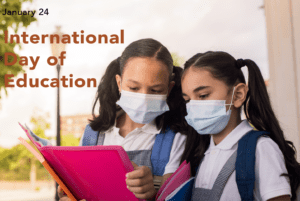
This year’s International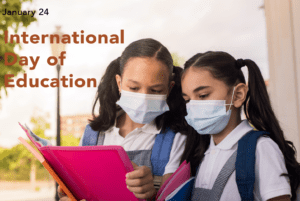 Day of Education theme is ‘To Invest in People, Prioritize Education’. Indeed, quality and inclusive education has been deemed as one of the fastest and surest ways to pull children and entire communities out of poverty. Access to education directly corresponds with the levels of development, as evidenced by measures such as the Human Development Index, Sustainable Development Goals, and the Multidimensional Poverty Index, all across the globe.
Day of Education theme is ‘To Invest in People, Prioritize Education’. Indeed, quality and inclusive education has been deemed as one of the fastest and surest ways to pull children and entire communities out of poverty. Access to education directly corresponds with the levels of development, as evidenced by measures such as the Human Development Index, Sustainable Development Goals, and the Multidimensional Poverty Index, all across the globe.
The Sustainable Development Goals (SDGs) prioritize education, formal, informal and non-formal education, as a means to end all forms of poverty and as an end goal in itself. With less than 7 years left to realize the Agenda 2030 and its SDGs, we need to consider – are we on track to achieving education for all children?
“Ensure inclusive and equitable quality education and promote lifelong learning opportunities for all” – Goal 4, Sustainable Development Goals.
At the height of the Covid-19 global pandemic, children suffered an immeasurable blow to their education as schools worldwide were temporarily shut down, and learning switched from physical classrooms to virtual platforms. Not only did the digital divide impede the progress of the children and schools with inadequate access to online learning infrastructure, but the brunt of the pandemic lead to an increased strain on children’s mental health and wellbeing. More than that, the resultant widespread loss of livelihoods meant that more people were thrust into poverty, thereby affecting children’s education.
Coupled with the growing shocks brought on by climate change and violent conflicts, The total adverse impacts to education are still being experienced globally, even as the severity of pandemic wanes 3 years on. These global upheavals and opportunities necessitate innovative solutions investing in children’s education and outcomes leading to overcoming child poverty.
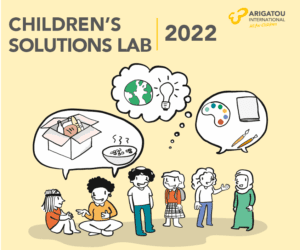 The Children’s Solutions Lab by Arigatou International has been one of such nascent spaces for children to come up with solutions against poverty through education. First launched in 2020, the Children’s Solutions Lab is one of Arigatou International’s meaningful spaces for child participation, whose aim is to support young people in taking action to address poverty affecting children in their communities through solutions based on education. Most noticeable, children from Cuba, India, Malawi and Peru have, through the Children’s Solutions Lab come up with unique and innovative solutions towards promoting education especially for vulnerable children.
The Children’s Solutions Lab by Arigatou International has been one of such nascent spaces for children to come up with solutions against poverty through education. First launched in 2020, the Children’s Solutions Lab is one of Arigatou International’s meaningful spaces for child participation, whose aim is to support young people in taking action to address poverty affecting children in their communities through solutions based on education. Most noticeable, children from Cuba, India, Malawi and Peru have, through the Children’s Solutions Lab come up with unique and innovative solutions towards promoting education especially for vulnerable children.
“Through the Children’s Solutions Lab, we want to focus on how education can help in ending child poverty. We are looking for innovative, sustainable, relevant and replicable solutions that we can support, aimed at ending child poverty” Maria Lucia Uribe – Director Arigatou International – Ethics Education.
The Children’s Solutions Lab seeks to promote ethical reflections among children about the root causes of poverty and how some cultural norms can impact the wellbeing of children and, ultimately, lead to child poverty.
The post <strong>Education – the fastest way to pull children out of poverty</strong> appeared first on End Child Poverty.
The post Education – the fastest way to pull children out of poverty appeared first on Arigatou International.

Education – the fastest way to pull children out of poverty

This year’s International Day of Education theme is ‘To Invest in People, Prioritize Education’. Indeed, quality and inclusive education has been deemed as one of the fastest and surest ways to pull children and entire communities out of poverty. Access to education directly corresponds with the levels of development, as evidenced by measures such as the Human Development Index, Sustainable Development Goals, and the Multidimensional Poverty Index, all across the globe.
Day of Education theme is ‘To Invest in People, Prioritize Education’. Indeed, quality and inclusive education has been deemed as one of the fastest and surest ways to pull children and entire communities out of poverty. Access to education directly corresponds with the levels of development, as evidenced by measures such as the Human Development Index, Sustainable Development Goals, and the Multidimensional Poverty Index, all across the globe.
The Sustainable Development Goals (SDGs) prioritize education, formal, informal and non-formal education, as a means to end all forms of poverty and as an end goal in itself. With less than 7 years left to realize the Agenda 2030 and its SDGs, we need to consider – are we on track to achieving education for all children?
“Ensure inclusive and equitable quality education and promote lifelong learning opportunities for all” – Goal 4, Sustainable Development Goals.
At the height of the Covid-19 global pandemic, children suffered an immeasurable blow to their education as schools worldwide were temporarily shut down, and learning switched from physical classrooms to virtual platforms. Not only did the digital divide impede the progress of the children and schools with inadequate access to online learning infrastructure, but the brunt of the pandemic lead to an increased strain on children’s mental health and wellbeing. More than that, the resultant widespread loss of livelihoods meant that more people were thrust into poverty, thereby affecting children’s education.
Coupled with the growing shocks brought on by climate change and violent conflicts, The total adverse impacts to education are still being experienced globally, even as the severity of pandemic wanes 3 years on. These global upheavals and opportunities necessitate innovative solutions investing in children’s education and outcomes leading to overcoming child poverty.
 The Children’s Solutions Lab by Arigatou International has been one of such nascent spaces for children to come up with solutions against poverty through education. First launched in 2020, the Children’s Solutions Lab is one of Arigatou International’s meaningful spaces for child participation, whose aim is to support young people in taking action to address poverty affecting children in their communities through solutions based on education. Most noticeable, children from Cuba, India, Malawi and Peru have, through the Children’s Solutions Lab come up with unique and innovative solutions towards promoting education especially for vulnerable children.
The Children’s Solutions Lab by Arigatou International has been one of such nascent spaces for children to come up with solutions against poverty through education. First launched in 2020, the Children’s Solutions Lab is one of Arigatou International’s meaningful spaces for child participation, whose aim is to support young people in taking action to address poverty affecting children in their communities through solutions based on education. Most noticeable, children from Cuba, India, Malawi and Peru have, through the Children’s Solutions Lab come up with unique and innovative solutions towards promoting education especially for vulnerable children.
“Through the Children’s Solutions Lab, we want to focus on how education can help in ending child poverty. We are looking for innovative, sustainable, relevant and replicable solutions that we can support, aimed at ending child poverty” Maria Lucia Uribe – Director Arigatou International – Ethics Education.
The Children’s Solutions Lab seeks to promote ethical reflections among children about the root causes of poverty and how some cultural norms can impact the wellbeing of children and, ultimately, lead to child poverty.
The post <strong>Education – the fastest way to pull children out of poverty</strong> appeared first on End Child Poverty.
The post Education – the fastest way to pull children out of poverty appeared first on Arigatou International.

Promoting social cohesion through community dialogue
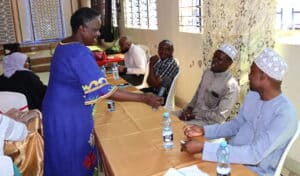
Arigatou International – End Child Poverty in collaboration with the Uzalendo Afrika Initiative and Elim Fellowship Church, Nyali – Mombasa organised a community dialogue between 28th – 29th November; bringing together over 50 diverse participants/stakeholders in the community. They included; youth, women, religious leaders and government officials. Community dialogues is a critical lifeline to promoting peace as they provide the perfect avenues for partnerships between different actors within the community.
Acknowledging that peacebuilding out- comes do not follow a linear pathway of change, the community dialogue was positioned to provide an opportunity for to not only contextualize drivers of conflict but assess the levels of conflict, review and monitor some of the emerging new dynamics around Preventing, Countering Violent Extremism (PCVE), faith, and elections.
“We need to look at Freedom of Religion or Belief (FoRB) within the context of communities. Religious leaders need to help communities in understanding and proper interpretation of religious texts” Gerald Acho, Regional Peace Programme Lead; Arigatou International – End Child Poverty. The community conversations revealed that in order to build social cohesion, some tenets towards sustainable social cohesion were identified as collaboration with different stakeholders, em- powering others to give feedback on work done on social cohesion and inclusion of leaders at different levels. While meaningful and consistent dialogue sessions were lauded as effective ways to building stronger and cohesive communities, youth and women were called upon to take up available opportunities and initiatives in communities and within government to empower themselves and help build more cohesive communities.
Read on the community dialogue
The post <strong>Promoting social cohesion through community dialogue</strong> appeared first on End Child Poverty.
The post Promoting social cohesion through community dialogue appeared first on Arigatou International.

Promoting social cohesion through community dialogue

Arigatou International – End Child Poverty in collaboration with the Uzalendo Afrika Initiative and Elim Fellowship Church, Nyali – Mombasa organised a community dialogue between 28th – 29th November; bringing together over 50 diverse participants/stakeholders in the community. They included; youth, women, religious leaders and government officials. Community dialogues is a critical lifeline to promoting peace as they provide the perfect avenues for partnerships between different actors within the community.
Acknowledging that peacebuilding out- comes do not follow a linear pathway of change, the community dialogue was positioned to provide an opportunity for to not only contextualize drivers of conflict but assess the levels of conflict, review and monitor some of the emerging new dynamics around Preventing, Countering Violent Extremism (PCVE), faith, and elections.
“We need to look at Freedom of Religion or Belief (FoRB) within the context of communities. Religious leaders need to help communities in understanding and proper interpretation of religious texts” Gerald Acho, Regional Peace Programme Lead; Arigatou International – End Child Poverty. The community conversations revealed that in order to build social cohesion, some tenets towards sustainable social cohesion were identified as collaboration with different stakeholders, em- powering others to give feedback on work done on social cohesion and inclusion of leaders at different levels. While meaningful and consistent dialogue sessions were lauded as effective ways to building stronger and cohesive communities, youth and women were called upon to take up available opportunities and initiatives in communities and within government to empower themselves and help build more cohesive communities.
Read on the community dialogue
The post <strong>Promoting social cohesion through community dialogue</strong> appeared first on End Child Poverty.
The post Promoting social cohesion through community dialogue appeared first on Arigatou International.

Empowering Children with Disability in Montenegro
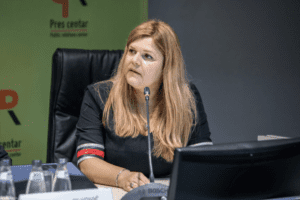
GNRC member Djeca Crne Gore-Children of Montenegro focuses on children and youth living with disability. Since 2016, we have provided sessions for children with psychologists, speech therapists, social workers, and personal assistants, free of charge, with support from donors. This is because it is a challenge to get experts who can work with children in areas where most people speak Albanian. Aside from the language barrier, large class sizes prevent individualized learning plans for children in public schools, raising the potential for bullying.
Despite challenges posed by COVID-19, we assisted twenty-one families whose children received daily hour-long individual treatments. We organized ten workshops with families to help them overcome stress and come to terms with their children’s unique situations. The workshops helped them establish self-care so they can be of more support to their children. The parents also learned how to play with their children and stimulate their development. Additionally, we organized training for forty teachers on how to tailor educational plans to individual children, as well as develop transitional plans for those entering secondary school.
Our future plans include building stronger connections with institutions and practitioners to better respond to needs and engaging more local authorities.
I am most grateful that our efforts are being recognized countrywide, and I feel privileged to have been awarded the Iskra Philanthropy Award, a special recognition for civic contribution to the common good.
Sabra Decević
Coordinator, GNRC Montenegro
The post <strong>Empowering Children with Disability in Montenegro</strong> appeared first on Global Network of Religions for Children.
The post Empowering Children with Disability in Montenegro appeared first on Arigatou International.






